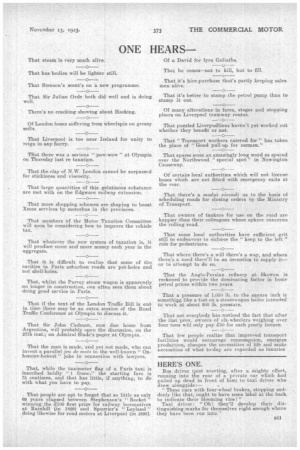ONE HEARS
Page 3

If you've noticed an error in this article please click here to report it so we can fix it.
That steam is very much alive.
That bus bodies will be lighter still.
That Stenson's scent's on a new programme.
That Sir Julian Orde both did well and is doing well. • There's no cracking showing about Hacking.
Of London buses suffering from wheelspin on greasy seas.
That Liverpool is too near Ireland for unity to reign in any hurry.
That there was a serious "pow-wow "Sat Olympia on. Thursday last re taxation.
That the clay of N.W. London cannot be surpassed for stickiness and viscosity.
That large quantities of this gelatinous substance are met with on the Edgware railway extension.
That more shopping schemes are haping to boost Xmas services by motorbus in the provinces.
That members of the Motor Taxation Committee will soon be considering how to improve the vehicle tax.
That whatever the new system of taxation is' it will produce more and mare money each year in the aggregate.
That it is difficult to realize that some of the cavities in Paris suburban roads are pot-holes and not shell-holes.
That, whilst the Purrey steam wagon is apparently no longer in construction, one often sees them about doing good service in Paris.
That if the text of the London Traffic Bill is out in time there may be an extra session of the Road Traffic Conference at Olympia to discuss it.
That Sir John Cadman, now due home from Argentina, will probably open the discussion, on the 27th inst.; on Admiral Slade's paper at Olympia..— That the man is made, and yet not made, who can invent a parallel jot de mats to the well-known " Onhonour-honest " joke in connection with lawyers.
That, while the taximeter flag of a Paris taxi is inscribed boldly " franc," the starting fare is 75 centimes, and that has little, if anything, to do with what you have to pay.
That people are apt to forget that so little as only 69 years elapsed between Stephenson's " Rocket ' winning the £100 first prize for railway locomotives at Rainhill (in 1829) and Spurrier's " Leyland " doing likewise for road motors at Liverpool (in 1898). Of a David for tyre Goliatlas.
That he comes—not to kill, but to fill.
That it's hire-purchase that's partly keeping sales men alive.
That it's better to stamp the petrol pump than to stamp it out.
Of many alterations' in fares, stages and stopping places on Liverpool tramway routes.
That puzzled Liverpudlians haven't yet worked out whether they benefit or not.
That "Transportworkers catered for" has taken the place of "Good pull-up for carmen."
That spares seem an amazingly long word as spaced over the Northwood " special spot" in Newington Causeway.
Of certain!. local authorities which will not license buses which are not fitted with emergency exits at the rear.
That there's a modals vivendi as to the basis of scheduling roads for closing orders by the Ministry of Transport.
That owners of tankers for use on the road are happier than their colleagues whose sphere concerns the rolling road.
That some local authorities have sufficient grit still to endeavour to enforce the " keep to the left " rule -for pedestrians.
That where there's a will there's a way, and where there's a need there'll he an invention to supply it— or to attempt to do so.
That the Anglo-Persian refinery at Skewen is reckoned to provide the dominating factor in homepetrol prices within two years.
That a pressure of 1,050 lb. to the square inch is somethiag like a test on a steamwagon boiler intended to work at about 200 lb. pressure.
That not everybody has ,noticed the fact that after the 31at prox. owners of six-wheelers weighing over four tons will only pay £30 for each yearly licence.
_ — That few people realize that improved transport facilities would encourage consumption, energize produetion, cheapen the necessities of life and make necessities of what to-day are regarded as luxuries
















































